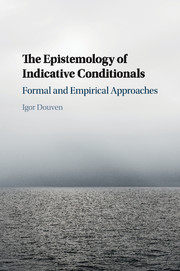5 - Closure
Published online by Cambridge University Press: 05 November 2015
Summary
It was said earlier that the Lockean Thesis (LT) is meant as an answer to the question of how the epistemology of belief and the epistemology of degrees of belief are connected. As such an answer, the thesis is generally judged to be plausible, even though, as was seen in the last section of the previous chapter, some hold that it gives intuitively wrong verdicts about the acceptability of lottery propositions. Kyburg, one of the main advocates of LT, discovered that this thesis actually gives rise to more than a little friction with pretheoretical judgment, at least when it is combined with a prima facie equally plausible principle, to wit,
Closure principle (CP) If it is rational for a person to accept each φ ∈ Φ, and ψ follows logically from Φ, then it is rational for the person to accept ψ.
Specifically, Kyburg [1961:197] showed that the conjunction of LT and CP gives rise to (what is now known as) the Lottery Paradox. In a nutshell, the paradox is that, given a large enough fair lottery with only one winner, LT makes it rational to accept of each single ticket that it will lose, and then CP makes it rational to accept that all tickets will lose, even if it is known – and a fortiori rationally acceptable – that one ticket is going to win. Not long after the discovery of the Lottery Paradox, Makinson [1965] discovered a similar paradox, the so-called Preface Paradox: By LT, an author can rationally accept each of a number of claims that he or she has carefully researched and which, accordingly, he or she believes to a degree exceeding θ. Then CP makes it rational to accept the conjunction of all these claims. This is so even if, as may easily be the case, the author's degree of belief in that conjunction does not exceed θ and thus, according to LT again, is not rationally acceptable.
- Type
- Chapter
- Information
- The Epistemology of Indicative ConditionalsFormal and Empirical Approaches, pp. 123 - 149Publisher: Cambridge University PressPrint publication year: 2015



